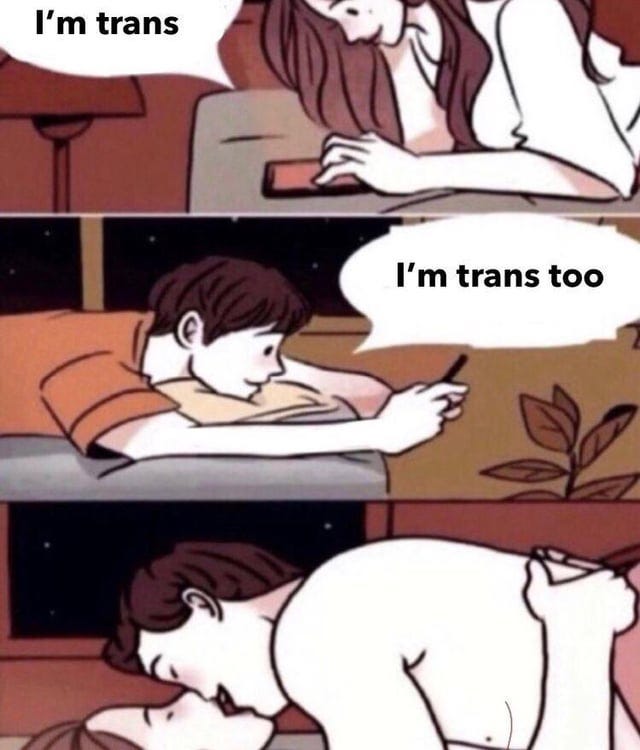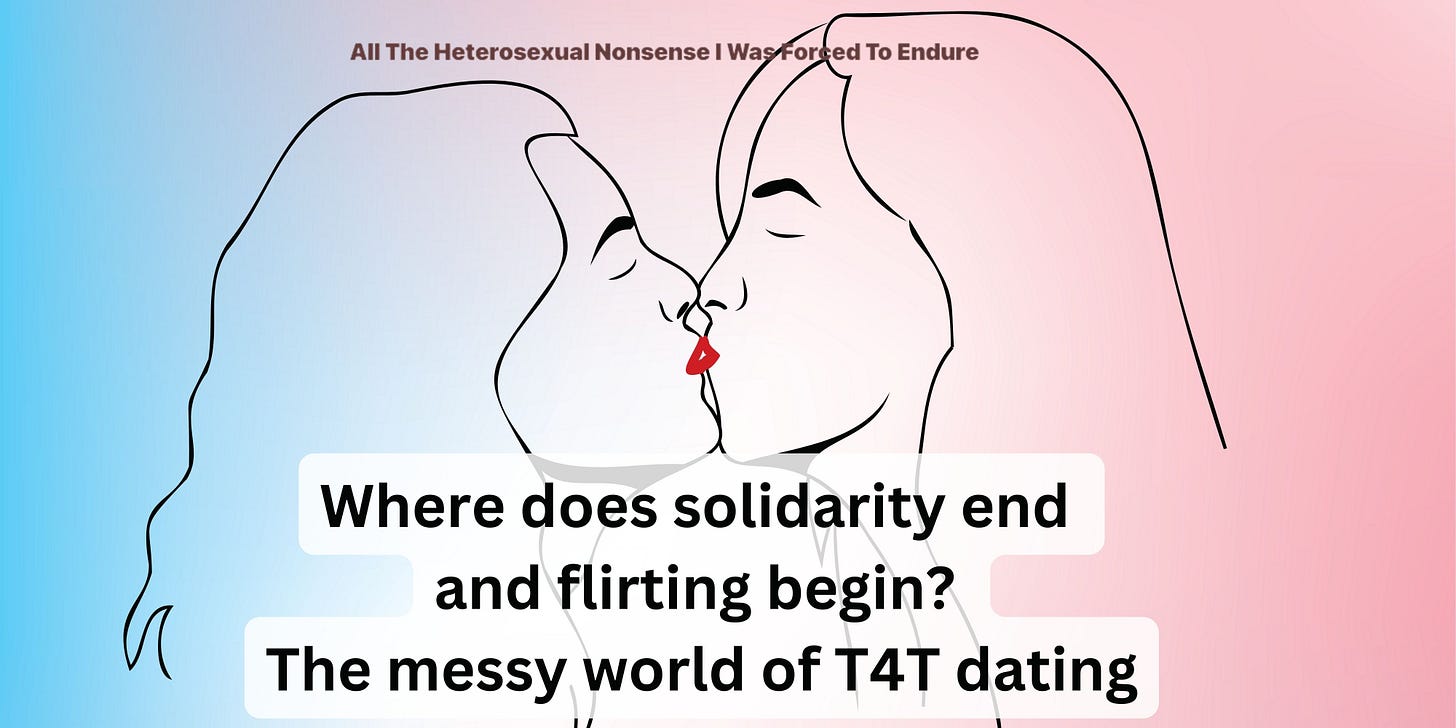Where does solidarity end and flirting begin? The messy world of T4T dating.
Yes, we date each other. And yes, it gets complicated.
Back in May, Zooey Zephyr, the first trans person to be elected to the Montana House of Representatives, proposed to her girlfriend, Erin Reed, a fellow trans femme activist.
This video (which I definitely haven’t watched a million times,) spawned a congratulatory message from the White House and a great deal of confusion from anti-trans commentators who couldn’t understand that it was possible for trans women to even be attracted to, let alone enjoy healthy relationships with other trans women in their community. Aren’t we all just pornsick predators desperate for male validation and wanting to harass cis women? Uhhhh…
Naturally, the trans lesbian community, Erin included, reacted to this with intense hilarity. Anybody who knows anything about trans women knows that not only do we date each other, it’s become a meme that trans community events double as dating events too. Oh, someone started up a Discord server for young trans women? Chances are its users are going to be hooking up by the end of the month.
People throw around all sorts of reasons for why this happens, some of which verge onto transmisogynistic stereotypes that trans women are intrinsically horny, but the reality is that nearly every trans woman I’ve ever met has an immense level of trauma from cis people and we simply don’t trust them enough to be safe for us to date.

I’m guilty of this myself. I’m a polyamorous trans woman, meaning I don’t restrict myself exclusively to just one relationship, and all four of my partners are trans feminine too. Even all of my metamours (meaning my partners’ other partners,) are trans femmes.
Misunderstood
Countless people in the past, such as my family or my former co-workers, have questioned the legitimacy of my relationships because of this. As if my polyamory or my partners being other trans femmes were reasons to suggest that I was less serious about my relationships than I would be if my partners were cis and I were monogamous. But this clearly isn’t true! All my relationships are emotionally committed, my partners are all close friends with each other, we exchange emotional and financial support when we need it, and I couldn’t be happier with it.
As Zooey and Erin also demonstrated, T4T couples can get engaged and make plans to marry just like anyone else. I would love to marry too if it meant that my DSP payments wouldn’t get cancelled. Thanks Centrelink!
Honestly, it amuses me to no end that cis people find these “revelations” about the nature of the trans lesbian community surprising. Trans women are an oppressed demographic, who often struggle in poverty, are reliant on an underfunded medical system for our hormones, and tend to lack family support too. Just being a trans femme itself is almost always a deeply traumatic experience that you can only truly understand if you’ve experienced it yourself, so why wouldn’t it make sense that we would seek each other out and form a very tightly-knit community? Why wouldn’t it then follow that sexual desire or romance would blossom within that community too?
This is an effect of the lack of positive representation of trans people in the media, particularly including the fact that trans content made by trans people rarely gets a strong audience beyond the trans community itself. It then follows that T4T relationships are somehow even more invisible than that. This is something we can, and should, change in the future, as I firmly believe that showcasing the reality of our lives to the broader world will be key to our liberation. Who doesn’t love some cute queer romance stories?
But above all else, I want to change the questions being asked here. It shouldn’t be “does this happen at all?” - it should be, “wait, wouldn’t T4T relationships get messy?” And oh yeah, they sure do!
Solidarity and dating
How do you mix solidarity with dating? Well, the short answer is: poorly. When your crushes, your partners and your exes are all present at an event designed to create community, and there are also anxious young trans girls there who just want support to escape bad living situations and/or access hormones, things will get hectic.
Drama in the trans community is commonplace and plenty of trans women report feeling alienated from their peers because of it. There’s no easy way to manage it either. I’ve met two of my partners through Twitter, which sometimes gets memed as a trans femme dating app for the amount of relationships that start from people meeting on “Trans Twitter”, but my most recent relationship started because I caught feelings for a girl I’ve been working with on a community project.
The heart wants what the heart wants, especially when a large chunk of the world wants to see your demographic wiped out, and I knew ignoring my feelings would be a very bad idea given that we needed to work closely together. I don’t recommend developing intense crushes on fellow activists if you can help it, but I’m happy to report in my case that it worked out, we’ve been dating for nearly a year, and the project is still progressing. But I’m lucky and extremely cautious with my flirting. Others are less so.

I’ve seen countless trans Discord servers fall apart over messy break-ups, and the fallout often plays out very publicly, sometimes onto other social media sites too. It would be funny if it wasn’t so painful, and if these communities weren’t also actually necessary for young girls who need that kind of support.
I’ve even seen trans girls feel uncomfortable about going to events organised by NGOs due to the aftershock of this variety of conflict. I once called one of these NGOs describing an incident like this, and was met with a response of “it’s a personal issue, it’s not our problem”. That’s the thing, though. It really is! When it affects the ability of trans people to access support, it absolutely is our problem. There’s no one else’s problem it could be.
I wish there were some easy answers to the question of where solidarity ends and flirting begins, but the reality is there often isn’t one in practice. Separating feelings from friendship is hard at the best of times. These added complications are a natural response to the level of marginalisation we receive. If anything, trans women are expected to have a much higher level of emotional control than the general population.
It’s pretty standard for media involving cishet monogamous couples to have plotlines revolving around jealousy that arises when your partner gets a close friend of the same gender as you, as though having a female friend as a man means you instantly want to sleep with her or vice versa. Come on. “Trans girl meets trans girl – instant hook up” is the stereotype that gets made about us and, let’s be real, we’re a lot better at it than you, cishets!
Dating online
Online relationships are common for trans women as well, given the fact that so many of us meet each other through the Internet and there are so few of us relative to everybody else. It’s not the most ideal scenario to jump onto Twitter or a Discord server hoping to find answers about where the trans-friendly doctors are, or even just to make friends who will understand your personal experience, only to find yourself in a position where attraction and emotions are everywhere.
But there’s genuinely no simple solution. In order for these problems to be solved, there have to be immense changes not only to how the needs and love lives of trans people are viewed, but determined inclusive initiatives across all kinds of other institutions as well. There are few, if any, relationship counsellors, sex therapists, or even mental health professionals equipped to handle problems within T4T relationships. The mistrust for cis people runs deep, and not for no reason.
This isn’t even touching on the prospect of T4T relationships becoming abusive. Poverty and marginalisation are breeding grounds for toxic relationships to form even between monogamous cishet couples, while dealing with them in the trans community creates even more problems. But that’s a topic for another article.
T4T relationships would continue even if cis people were less shit to trans people, and there’s absolutely nothing wrong with that. On the contrary, T4T relationships are great when they work, just like any other type of relationship, they just need to be better supported and understood by the wider community. Our experience is a natural symptom of our lack of safe access to the types of support cishet people take for granted in maintaining their relationships, alongside a lack of resources we need to maintain them for ourselves. With all of that in mind, I think we’re doing pretty well.
Zooey and Erin are both relatively wealthy and comfortable and don’t represent the vast majority of T4T relationships that I encounter in my day-to-day interactions with other trans women. However, I do hope they start the ball rolling on T4T relationships entering the public eye, so that we can have these kinds of conversations to a wider audience. T4T love is as real as any kind of love, so let’s not leave it behind when we say that “love wins”.
—
Natalie Feliks is a writer and activist originally from Adelaide, now living in Melbourne. She's written for the likes of Junkee, Crikey, and Overland, and spends her time listening to pop music and eating chocolate.
FURTHER READING:
T4T: When Trans People Date Each Other - Parlour Talk
Why Is It So Hard For Trans People To Find A Respectful Hookup Online? - Huffington Post
The Zooey Zephyr I Love, From The Woman She Just Proposed To - Erin in the Morning
“It shrinks your dating pool in a big way” - What it’s like to date as a trans woman - Mamamia
“Bad news for single bigots - most dating apps have zero tolerance for your sad transphobia - PinkNews





